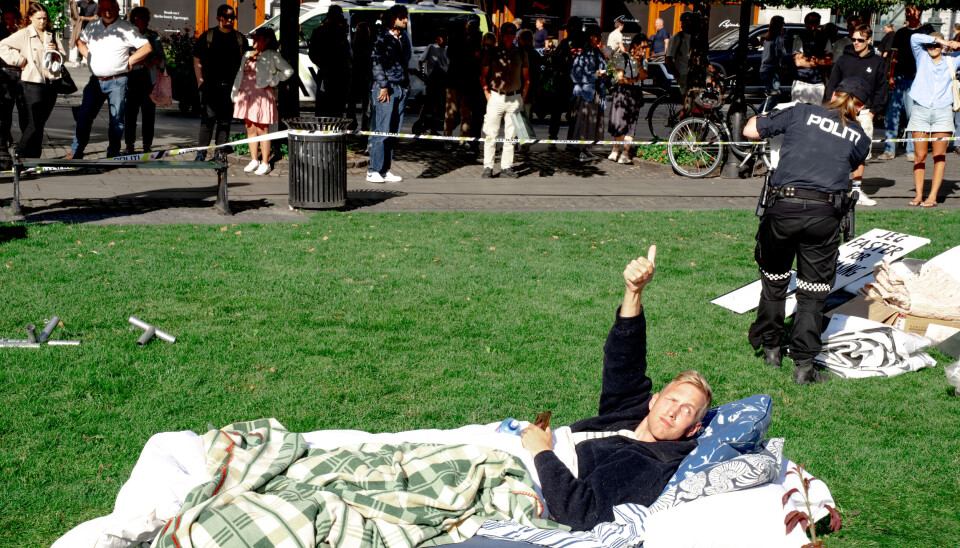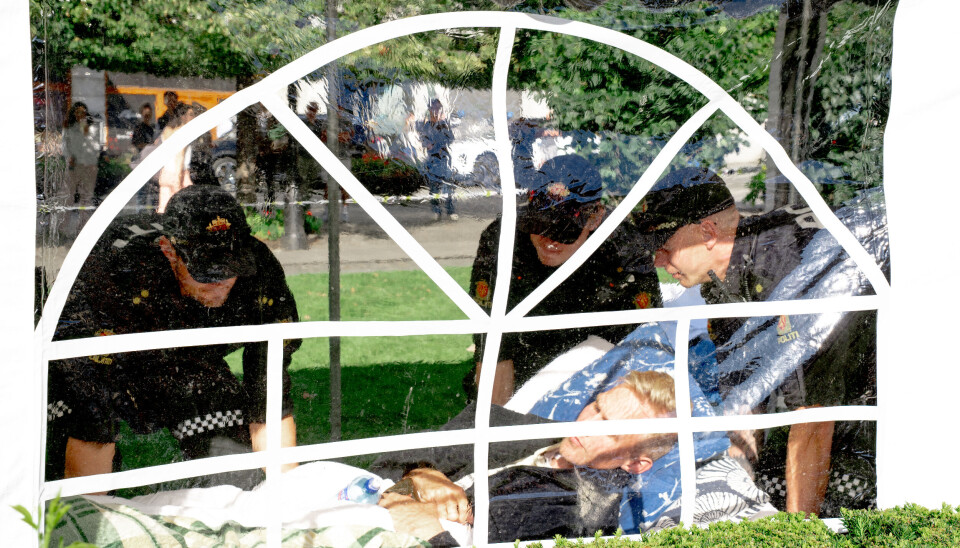
Going Hungry for Change
Stortinget in Oslo has become the last stop in an activist's 40-day hunger strike against new Norwegian oil.
As the Norwegian parliamentary elections approach, climate activists are taking to the streets. The perceived weakness of the government's climate policy has sparked resistance around the country, from the anti-mining protests in Reppafjord to the struggles against new oil and gas organized in Bergen by the Extinction Rebellion.
Striking for an oil-free tomorrow
Millions will starve as a consequence of this. So I think it's a fitting demonstration of personal willingness to take risks
– I'm doing it now because climate is not being discussed enough before the election, and most importantly, the phase out of oil, says Vebjørn Bjelland Berg (29).
For the climate activist, the electoral period has turned into a forty-day-long hunger strike with the aim of getting politicians talking about what activists say is not being addressed sufficiently: our common future on the planet.
– The oil Norway extracts will have the potential consequence of killing millions of people, says Bjelland Berg.
The hunger strike that started in Stavanger and moved all the way to Oslo has been accompanied by multiple other protests and rallies.
– I know that there are many people who stand behind me. [The strike] then also represents the fact that there are more people who see the injustice and are willing to take to the streets, Bjelland Berg says.

Why a hunger strike?
Bjelland Berg’s hunger strike started in the beginning of August, and is planned to continue for nearly twenty more days. But why starve for the climate?
– Millions will starve as a consequence of this. So I think it's a fitting demonstration of personal willingness to take risks.
According to WFP USA (World Food Program), climate change is leading to extreme weather events, such as hurricanes, floods and droughts, occurring more frequently. These events greatly affect the production and distribution of food globally and play a fundamental part in creating hunger. Issuing new oil is said to lead to a worsening of the climate crisis and of its consequences.
– The fact that we're licensing more oil in Norway goes against a recent advisory from the International Court of Justice, which declares that countries that do that can be held liable for the damages.
For the activists supporting Bjelland Berg, the protest is also a stance of solidarity with different political struggles.
Stian Wiig (24), one of the organisers of the protest and a recent graduate form the Norwegian Academy of Music, talked about the interconnections between the struggle for climate justice and the ongoing genocide in Palestine.
– There are clear parallels between Vebjørn’s action and the situation in Gaza right now. For the past few weeks, we've been hearing about the ongoing famine in Gaza, and we want to show that Vebjørn's action is also standing in solidarity with the Palestine movement.
Wiig emphasised that this is not solidarity merely between groups with different but overlapping goals, but also between the members of the bigger activist network in Oslo.
– It's mostly a show of solidarity for Vebjørn and for each other. It's important to be part of a bigger structure of activists in Oslo right now.
Student activism
Throughout the interview Bjelland Berg had very strong opinions about student involvement, as it was during his university years that he got into climate activism.
– It was the year 2018 or 2019, with raising awareness around the climate issue. The level of danger that we were in sunk so deep into me that taking part in a group became the only viable thing to do.
Years after finishing his studies he still thinks that including students in political movements is invaluable.
– Students have been at the forefront of social change for centuries, we need them to organize in order to maintain human rights, democracy, even the possibility for people to take higher education in the decades to come. It's incredibly important that students organize.
The organizing crew of the fast is itself composed of former and current students. Leading by example, they put trust in the rebellious nature of students and their proneness to civil disobedience.
– Students and young people have yet to be pacified or corrupted by years of living in a society. Somehow there seems to be more fire in them, Wiig said.

The police at Stortinget
At Stortinget, the police are getting ready to remove Bjelland Berg’s tent from the patch of grass in front of the building.
– I want the police to uphold democracy, which is not what they're doing by removing this tent. I have a right to be here, which is set in the European Convention on Human Rights, he says.
Protesting in front of Stortinget carries for Bjelland Berg an important political message that not only has to do with his climate activism.
– I think there are issues with our current political system that create an elite sphere, especially inside the large parties. It’s a question of this elite political commercial class, which I think is antithetical to democracy.
An hour after the interview, the tent is removed while Bjelland Berg and his crew sit inside chanting: Never doubt that a small group of people can change the world. Indeed, it is the only thing that ever has.
After a couple of hours, a new tent stands outside Stortinget. This is not the first time a new one is brought in. Nor is it the last one, if the activists are to be believed.































